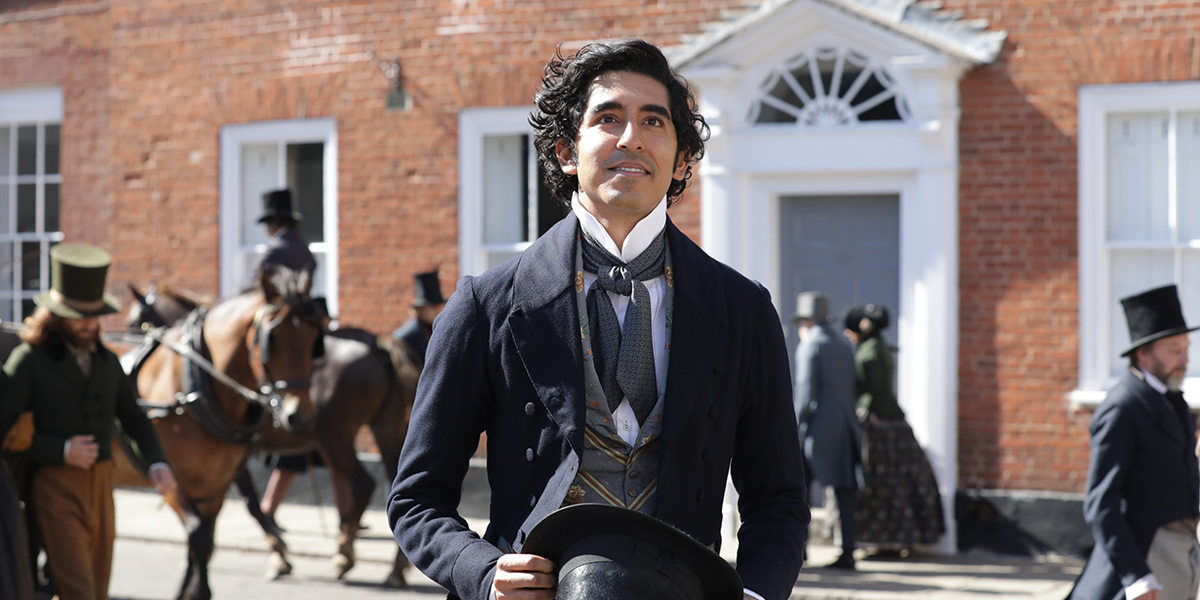It should come as no surprise that Armando Iannucci, being an Oxford graduate in English literature of a certain age, has something invested in the work of Charles Dickens. In fact, Iannucci hosted the 2012 BBC television special “Armando’s Tale of Charles Dickens,” in which he actively argues for Dickens’ relevancy as an engaging avenue into the modern world instead of a tired institution. Still, Iannucci’s province as a bleak, biting political satirist—his masterpiece TV show “The Thick of It”; the spin-off feature “In The Loop,” still the definitive Iraq War film; and the pitch-black historical comedy “The Death of Stalin”—makes his latest work, “The Personal History of David Copperfield,” feel a bit incongruous. As a longtime Iannucci fan, I got nervous when he introduced the film at its TIFF world premiere by saying he hoped “the themes of love and friendship” would resonate. Even in our current cultural hellscape, there still needs to be a place for comical examinations of narcissism and avarice, a clear-eyed view of mankind’s failure to responsibly retain power. Love and friendship shouldn’t have to be everyone’s raison d’être.
“The Personal History of David Copperfield” does feature Iannucci in a more straightforward mode, occasionally indulging his comedic sensibility but mostly operating on a conventional wavelength befitting a literary adaptation. Though this isn’t exactly what I personally want from someone who birthed the profound, profane Malcolm Tucker, Iannucci’s demonstrable understanding and appreciation of the source material goes a long way to making the film an enjoyable watch. It’s the work of a man who’s had this author’s worldview coursing through his blood for years.
Iannucci introduces Copperfield, wonderfully played by Dev Patel, at the lectern in front of a rapt crowd as he reads from his autobiography. The film then bursts through the backdrop of the stage to the setting of Copperfield’s birth and then we’re off to the races. We follow Copperfield from his humble origins as a precocious child, to when his evil stepfather shipped him off to work at a London bottle factory, to his tenure at boarding school, to his time working as a proctor, etc. Iannucci and Simon Blackwell’s script replicates Dickens’ episodic style well; each sequence sports a unique location and a new set of characters. Highlights include Hugh Laurie as the King Charles-obsessed Mr. Dick, Tilda Swinton as Copperfield’s donkey-shooing aunt, and Ben Whishaw as the incorrigibly sycophantic Uriah Heep. Peter Capaldi plays Micawber, and though his performance tends to unproductively err on the broad side, seeing him in an Iannucci project again after ten years away from the fold did bring a tear to my eye.
Truth be told, “David Copperfield” will live or die based on a person’s interest in Dickens and a faithful rendering of his work to the screen. It’s notoriously difficult to replicate a Dickensian tone, capturing both the overarching Victorian cruelty and the whimsy of the characters living through the era. Iannucci pulls it off for the most part, finding a comfortable middle ground where his actors can properly play. Moreover, he and Blackwell’s admirable commitment to bringing Dickensian language to life deserves much praise, and though the film’s quality varies on a scene-by-scene basis, the entire ensemble handles the verbiage quite well. It is funny, with the humor mostly arriving in the form of sight gags, physical setpieces, and broad deliveries. Iannucci never panders to topicality beyond his colorblind cast, which works wonders in updating the class struggles and exclusionary practices of the novel to the present day. (I’m not one for representation discourse, which I find reductive and frustrating on a good day, but I’ll admit it was nice to see a young Indian boy play Copperfield in his street urchin days, if only because India’s history of poverty makes the image an evergreen concern.)
“Copperfield” necessarily rushes everything in the homestretch, given it’s a two-hour adaptation of a 600+ page book, but the speed tends to blunt the emotional effect of some arcs. Plus, Iannucci overdoes it with the sentimentality in the film’s homestretch, ending the film on a really saccharine moment that could have easily been avoided. But if this represents Iannucci at his softest and most heartfelt, it’s far from an embarrassment, and at times, it’s a balm.

In Darius Marder’s “Sound of Metal,” Riz Ahmed plays Ruben, a metal drummer and recovering addict whose highly structured life with his girlfriend Lou (Olivia Cooke) is thrown asunder when he suddenly loses eighty percent of his hearing. After receiving a dire diagnosis from a doctor, he throws himself in a pit of denial and ties his hopes to cochlear implant surgery, which he believes can return him to “normal.” When Lou worries he’ll relapse because of the newfound stress, Ruben voluntarily enters a deaf community, which includes a rehab facility run by the helpful leader Joe (Paul Raci). It’s there where Ruben learns sign language, sheds his initial fear, and starts to live a new life, until his old one threatens to send him back to mental square one.
The conventional infrastructure of “Sound of Metal” belies its many pleasures, most notably a stellar performance from Ahmed and a unique sound design. Marder subtitles the entire film for the benefit of the deaf community and to properly communicate Ruben’s muffled hearing, a creative choice that pays off dividends in the back half of the film. Given that it’s both an addiction and disability film, “Sound of Metal” goes through a variety of standard story beats, but Ahmed’s frustrated, funny performance breathes life into a tired structure. He conveys Ruben’s evolution from pained skepticism to begrudging acceptance like a true professional, never once skimping on the explosive anger or stunning disappointment of a guy who has had to deal with new sets of obstacles his entire life.
Though I’m in no position to speak on behalf of the Deaf community in regards to accuracy of portrayal or plight, I found it notable that Marder integrates the controversy surrounding cochlear implant surgery into his film. Some in the Deaf community believe that cochlear implants are an affront to their culture, which hinges on the belief that deafness isn’t something to be fixed or cured. Marder doesn’t didactically explore the issue, but neatly incorporates it into Ruben’s naiveté surrounding his addiction. “Sound of Metal” perceptively understands an addict’s drive to replace his illicit addiction with a more socially respectable one. It’s heavily implied that Ruben’s high-octane drumming worked as a similar numbing agent to heroin, and subsequently his drive to raise the money for cochlear implant surgery neatly folds into this psychology. The sadness Raci evinces when his character tries to confront Ruben about this problem goes a long way to communicating the hard-won wisdom of a long-time addict and a Deaf person’s disapproval towards Ruben’s personal choice.
Marder employs a measured pace to render Ruben’s struggle believable, and it mostly works in his favor. “Sound of Metal” plays with a lot of dramatically simplistic ideas whose potency needs time to organically develop. In particular, the film’s central relationship more or less plays by the rules of couples borne out of extreme stress and trauma, i.e. Ruben and Lou need each other because they saved each other. Marder could have fallen back on clichés when depicting yet another high-passion relationship that has run its course, but the runtime helps it ripen into something low-key and sweet. Ahmed and Cooke believably sell the sadness of people naturally outgrowing true love, learning how to be themselves apart when all they’ve known are each other. “Sound of Metal” might be working from an old playbook, but it finds new ways to liven it up.

Marc Meyers’ “Human Capital” is the type of middling, middlebrow mediocrity that strives to be about capital-I Ideas but approaches them with the savoir-faire of a toddler. It boasts a talented ensemble cast who are at the mercy of a needlessly twisty script that views characters as pawns for a predictable climax. Subsequently, the actors must constantly play selfish or stupid not because specific characterizations require them to do so, but rather the design of Oren Moverman’s screenplay demands it. The film technically examines class, though its shallow understanding of the subject, let alone the human beings engaged with it, all but renders it irrelevant. “Human Capital” largely functions as a melodramatic exercise in watching actors flail through a project so obviously beneath them.
The plot concerns the hit-and-run of a waiter, with the perpetrator’s identity concealed until the final act. Moverman introduces the audience to a web of people related to the accident. Detailing every thread would take up too much space and exhaust precious energy on both myself and the reader, but here’s a condensed, still-too-long version: middle-class real estate agent Drew (Liev Schreiber) impulsively decides to invest in the high-risk, high-reward hedge fund of wealthy asshole Quint Manning (Peter Sarsgaard), the father of his daughter’s closeted sort-of-boyfriend (Fred Hechinger). The daughter, Shannon (Maya Hawke), begins seriously seeing Ian (Alex Wolff), a stock bad boy with a troubled past who says things like, “I’ll never say, ‘I love you,’ because it’s bourgeoisie bullshit.” Finally, in the strangest, most inconsequential sub-story, Quint’s unfulfilled former-actress wife (Marisa Tomei) wants to renovate a run-down repertory cinema because the kids supposedly need to see films like “Singin’ in the Rain” and “The Red Shoes” but really it’s because ennui needs to be redirected somewhere. Rep programming: the second-act métier of the miserable, bored rich!
Moverman re-stages events from three different perspectives so that the audience can get the fuller picture of the events leading up to the accident, a choice that makes less and less sense as “Human Capital” progresses. Why do we need a fuller picture when both the culprit’s identity and the clashing-of-desires climax are so broadly telegraphed? Moreover, Moverman’s script invests such little interest in its characters beyond their narrative utility that their plight, such as it, barely registers, rendering the “Crash”-like ending dead on arrival. The film’s general pointlessness would be less irritating if Meyers or Moverman included any superficial pleasures, but even the generally competent performances can’t really be appreciated on their own because they’re so hamstrung to an idiotic script. “Human Capital” mostly serves as a reminder that even the best actors can’t carry a film so hell-bent on validating its own self-seriousness.












